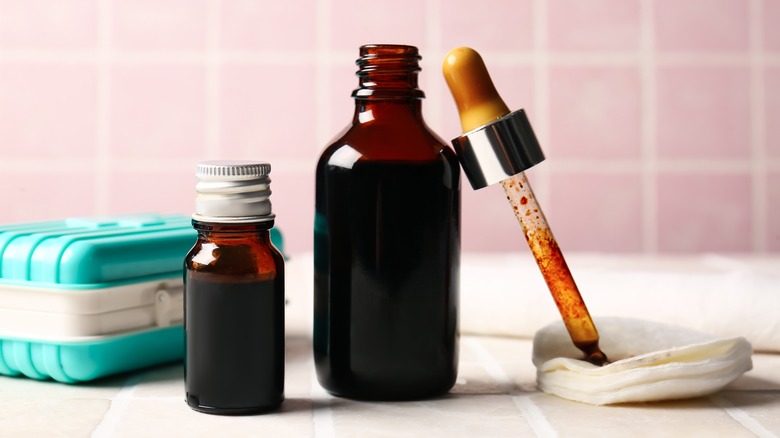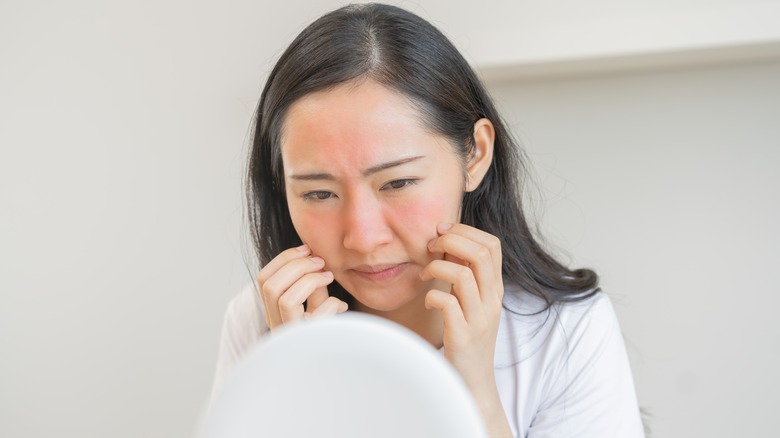Is It Safe To Use Iodine To Treat Breakouts On Your Skin? Everything We Know
Whether you're dealing with the occasional breakout or suffer from acne, pimples are a nightmare. Popping them is mostly worse for you than better, but sometimes it happens. If you've gone overboard with messing with a pimple, you might have come across a tip to use iodine to treat the area.
Another social media skincare trend is upon us, and it's using a medicinal disinfectant for treating pimples. A quick search on TikTok including the words "iodine" and "pimples" will show dozens of people claiming that putting iodine on their spots works like a charm and heals their blemishes quickly.
Before using it on the skin, it's crucial to know that in the medical world, iodine is used as an antiseptic to prevent skin infections. It is commonly applied before and after surgeries and can additionally be used on minor wounds and cuts. Hence, it's no wonder skincare aficionados have jumped on the iodine train in hopes of treating their breakouts. According to Jason Chouake, M.D., a dermatologist at the American Academy of Dermatology, iodine really is an effective spot treatment, as he explained in a conversation with HuffPost, but you shouldn't rely on it exclusively.
Iodine can help fight off acne-causing bacteria
Also referred to as povidone-iodine, this common antiseptic has antibacterial properties that help fight off acne-causing microbes, and it works quickly. "When povidone-iodine dries on the skin, it works as a disinfectant by rapidly penetrating into bacteria and other microorganisms, oxidizing key proteins and fatty acids, causing the death of those microbes," Jason Chouake, M.D., told HuffPost, adding that iodine is thus effective in improving acne.
According to a study done by Singapore's National University Hospital, povidone-iodine solutions proved useful to treat acne because of their antiseptic properties, which can help speed up the healing process. While it is safe to apply directly to the skin, iodine itself can leave a yellowish stain in the process but that can be removed with rubbing alcohol, and some iodine solutions are marketed as colorless. Iodine solutions are available without a prescription and come in different forms, from sprays to ointments. Make sure to apply it with a clean cotton swab or fingertips to minimize the risk of introducing more bacteria to the infected area.
However, it's important to note that not all acne is the same. Understanding different types of acne is crucial to knowing how to properly treat them, and iodine isn't going to work on all of them, according to dermatologist Kenneth Beer, M.D. "Many acne lesions are not bacterial and instead are blocked pores," he explained to NewBeauty, adding that iodine won't have a long-term effect on keeping all types of breakouts at bay.
The risks of using iodine for breakouts
Despite its seemingly magical acne-fighting properties, iodine shouldn't be used regularly as an acne treatment, said cosmetic dermatologist Jaishree Sharad, M.D. "One may develop irritation to povidone-iodine. [It should be used as an] SOS treatment for a day or two only, if nothing else is available," she shared with HuffPost.
Another thing to be extra careful about when using iodine as a spot treatment is not to leave it on for too long because it can cause contact dermatitis and hyperpigmentation. "Povidone-iodine is not meant to be left on the skin for extended periods of time. It has to be washed off," Jason Chouake warned. Those with sensitive skin should steer clear of topical iodine applications completely. A study published in the Indian Journal of Pharmacology showed that individuals with more sensitive skin can react to iodine with symptoms similar to chemical burns.
Whether you're building a skincare routine for sensitive skin or dealing with acne breakouts, focus on finding products that were specifically formulated for treating pimples. Chouake recommends using "gentle benzoyl peroxide washes, or hypochlorous acid washes or sprays," he told HuffPost. Whatever your skin issues, make sure to consult with your dermatologist before using medical supplies that weren't originally meant for treating breakouts, and patch test any products you haven't tried before.


